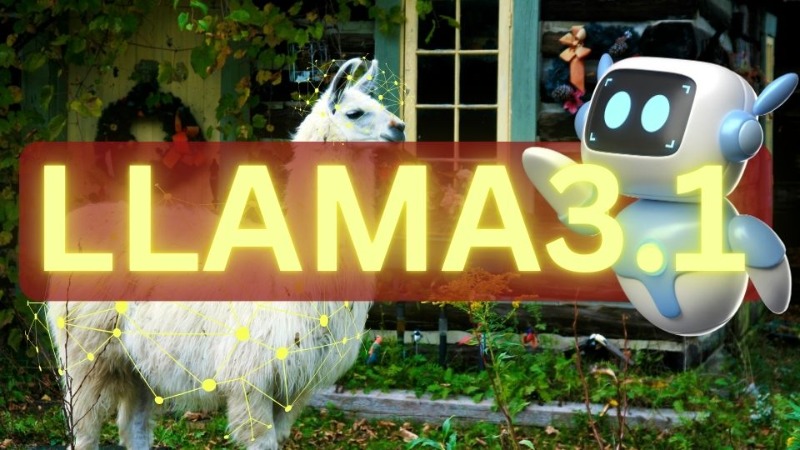- تلقي الشكر 19













Share your experience


alrayyancastle.com
شارك خبراتك
 LLAMA3.1
LLAMA3.1
قبل 1 سنة 3 شهور - قبل 1 سنة 3 شهور #6754
بواسطة abohasan
Large Language Model Architecture 3.1 (LLAMA3.1)
Overview
LLAMA3.1 is a large language model developed by Meta AI. It is an advanced version of the original LLAMA3 model, with a larger size and improved performance.
Model Architecture
LLAMA3.1 is a transformer-based language model. It consists of 137 billion parameters, making it one of the largest language models ever created. The model is trained on a massive dataset of text and code, including billions of web pages, books, and other documents.
Capabilities
LLAMA3.1 has a wide range of capabilities, including:
-- Natural language generation: Creating human-like text, including stories, poems, descriptions, and code.
-- Natural language understanding: Comprehending the meaning of text, answering questions, and summarizing documents.
-- Translation: Translating text between multiple languages.
-- Code generation: Writing code in various programming languages.
-- Question answering: Providing answers to questions based on its knowledge of the world.
-- Sentiment analysis: Determining the emotional tone of text.
Applications
LLAMA3.1 has potential applications in various fields, such as:
-- Education: Creating personalized learning experiences, providing instant feedback on student writing, and supporting language learning.
-- Customer service: Automating customer interactions, providing accurate and tailored responses.
-- Healthcare: Assisting with medical research, providing personalized health information, and supporting healthcare professionals.
-- Media and entertainment: Generating creative content, personalizing recommendations, and creating interactive experiences.
Ethical Considerations
As with any large language model, it is important to consider the ethical implications of LLAMA3.1. Potential concerns include:
-- Bias: The model may exhibit bias based on the data it is trained on.
-- Misinformation: The model may generate false or inaccurate information.
-- Misuse: The model could be used for harmful purposes, such as spreading hate speech or creating fake news.
Availability
LLAMA3.1 is currently in a closed beta phase, and access is limited to select researchers and organizations. Meta AI plans to make the model more widely available in the future.
Overview
LLAMA3.1 is a large language model developed by Meta AI. It is an advanced version of the original LLAMA3 model, with a larger size and improved performance.
Model Architecture
LLAMA3.1 is a transformer-based language model. It consists of 137 billion parameters, making it one of the largest language models ever created. The model is trained on a massive dataset of text and code, including billions of web pages, books, and other documents.
Capabilities
LLAMA3.1 has a wide range of capabilities, including:
-- Natural language generation: Creating human-like text, including stories, poems, descriptions, and code.
-- Natural language understanding: Comprehending the meaning of text, answering questions, and summarizing documents.
-- Translation: Translating text between multiple languages.
-- Code generation: Writing code in various programming languages.
-- Question answering: Providing answers to questions based on its knowledge of the world.
-- Sentiment analysis: Determining the emotional tone of text.
Applications
LLAMA3.1 has potential applications in various fields, such as:
-- Education: Creating personalized learning experiences, providing instant feedback on student writing, and supporting language learning.
-- Customer service: Automating customer interactions, providing accurate and tailored responses.
-- Healthcare: Assisting with medical research, providing personalized health information, and supporting healthcare professionals.
-- Media and entertainment: Generating creative content, personalizing recommendations, and creating interactive experiences.
Ethical Considerations
As with any large language model, it is important to consider the ethical implications of LLAMA3.1. Potential concerns include:
-- Bias: The model may exhibit bias based on the data it is trained on.
-- Misinformation: The model may generate false or inaccurate information.
-- Misuse: The model could be used for harmful purposes, such as spreading hate speech or creating fake news.
Availability
LLAMA3.1 is currently in a closed beta phase, and access is limited to select researchers and organizations. Meta AI plans to make the model more widely available in the future.
المرفقات:
آخر تعديل قبل 1 سنة 3 شهور بواسطة abohasan .
الرجاء قم بــتسجيل الدخول أو إنشاء حساب.. للإنضمام للمحادثة.
المشرفين: abdalrahman
الوقت لإنشاء الصفحة: 0.232 ثانية
Syndication Feeds
Who's Online
380 زائر، و1 أعضاء داخل الموقع
Latest Users
- perfectderma
- Aladdin22
- Tyler T861
- omniaadel11377
- s3oa77
- zaqwsxcderfv
- amar
- CCosplay
- locaksa
- nacniv
- tjrbtyonline
- محمد شريف
- نرمين
- يوسف إبراهيم
- nyggWBzFVSNDagKJCHguJhR
- youstina
- engy
- sama58
- youdtina
- mennasabryjbj@gmail.com
- uostina
- whirlpooll1
- المصرىىىىى
- plumberrr
- BluePhoenix
- محمود السيد
- تبصير
- mudasir5454
- aomr
- ayamahmoud3
- adham
- Awatlt
- nzSmtKpSDUeBDwRAggrxrh
- اجاكس ديتكتور2025
- alfagr
- Fluffyy
- alnosqsa
- eslamonn
- دعايا
- arbnew
- qjpIlVkFhMbRBTDWLHPNwL
- ESLAMUWK
- DXCpIWnvsn
- joeyochs76
- كينج دمنهور
- visa
- حنان وافي
- دنيا
- GiEDpmXIzvHXYIf
- makeolise3
 29.237%
Unknown
29.237%
Unknown
 17.327%
China
17.327%
China
 16.488%
Egypt
16.488%
Egypt
 15.099%
United States of America
15.099%
United States of America
 5.303%
Saudi Arabia
5.303%
Saudi Arabia
 3.792%
Qatar
3.792%
Qatar
 1.345%
United Arab Emirates
1.345%
United Arab Emirates
Total:
121
Countries
000043752












